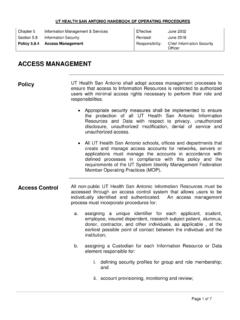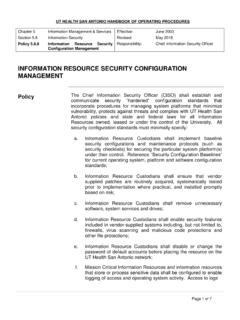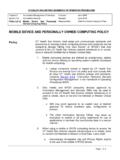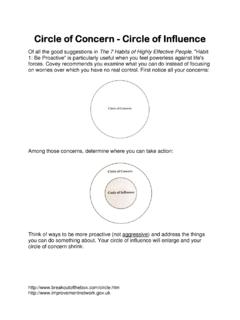Transcription of MANAGEMENT The Art of Managing Up - UT …
1 21 Defense AT&L: March-April 2007 Turkis an independent MANAGEMENT consultant. He is a retired Air Force lieutenant colonel and defense contractor. He has supported informationtechnology projects, policy development and strategic planning projects for DoD, other federal agencies, and non-profit organizations. He is a frequentcontributor to Defense AT& Art of Managing UpWayne TurkAbout 45 years ago, a satirical play (later a movie)called How to Succeed in Business Without Re-ally Tryingopened on Broadway. It offered amethod of moving up in the executive suite thatincluded a little murder and a lot of are better ways (even if you do have a boss you vefantasized about murdering). One of those methods ismanaging up. According to Thomas Zuber and Erika James, Managing up is the process of consciously working withyour boss to obtain the best possible results for you, yourboss, and your organization.
2 This is not political maneu-vering or kissing up. Rather, it is a deliberate effort to bringunderstanding and cooperation to a relationship betweenindividuals who often have different perspectives. MANAGEMENT or Manipulation? Managing up or Managing the boss sounds good in the-ory, but isn t it just another term for manipulating theboss or being the boss s toady? No! Managing the boss isa way to have a win-win-win situation where everyone,including the organization and project, wins. Failure tomanage the boss can result in misunderstandings aboutexpectations and cause wasted time and effort on tasksnot in line with organizational goals or the project s looking at it from a purely self-serving perspective,career progress rarely happens if you don t manage yourboss successfully. Team member, project manager, or program manager you have a boss, or in most cases, multiple bosses.
3 Youhave to worry about those bosses and their needs. Hav-ing more than one boss makes work more difficult be-cause you have to consider the needs or preferences ofeach of them. But it s still doable. If you are a manager at any level, you have to think aboutmanaging both up and down. Some managers pay at-tention to Managing eithertheir own bosses orthose peo-ple who report to them. It is the managers who only man-age up who give Managing the boss a less-than-stellarreputation. They appear to be the suck-ups or toadies;subordinates assume they don t care about them andmay withhold their respect or slack off in their work. Onthe other hand, the ones who only manage down can tadvocate for their team or gain buy-ins for the project sendeavors from those up the chain. Successful managerspay attention to Managing both directions and commu-nicating with their this article, I will deal with Managing up.
4 If you are cu-rious about successfully Managing down, see 10 Rulesfor Success as a Manager (Defense AT&L, August-Sep-tember 2004). Guidelines for Managing UpCommunicate. And make sure the communication is two-way. Most of the guidelines in this article are related tocommunication. Good communications skills are the basisfor being able to succeed in almost every situation. Com-munication with the boss can be verbal or written. Somebosses are readers, meaning they prefer to receive infor-mation in written form. Others are listeners, meaningthey prefer to get their information verbally. In DoD, get-ting information to your boss may be a briefing from youto him (and others). Listeners need to hear the informa-tion first, then they can consume a written version. Read-ers want the story on paper first so that they have sometime to digest and understand the issue before meetingto discuss it.
5 If you want your ideas to be heard, under-stood, and acted upon, make it easy for your boss bycommunicating in the manner with which he is mostcomfortable. You ll be meeting your boss s needs as wellas your own. But make sure that the communication istwo-way. You have to understand the boss s wants anddecisions. Listen and ask questions if you aren t it is a good idea to feed it back to confirm that yougot it right. No surprises don t surprise the boss. Even good sur-prises can backfire on you. Most readers can cite exam-ples of bringing the boss what they thought was goodnews, only to find out later that it that it wasn t so goodafter all. Let her know what is happening with the pro-ject on a regular basis so that she can brief her boss. Itmay be a quick meeting in her office; a daily, weekly, ormonthly e-mail; or some other exchange. Full-blown in-terim progress reports (formal meetings to discuss theproject status) on a regular schedule can help make surethat neither of you is solutions, not problems.
6 There are going to beproblems with your project. Every project has them. Butwhen you let your boss know about those problems, givehim your proposed solution(s). That shows him that youhave thought the situations through. There are supervi-sors who seem to want to hear only good news; they don twant to hear about problems. Those bosses represent aparticular challenge. It is up to you to help your boss faceproblems head on with courage and innovation. For thegood of the project and the organization, you must com-municate problems and failures with the successes, butdo so delicately and appropriately. That s when provid-ing him proposed solutions to the problems can reallypay honest and trustworthy. Dishonesty, covering up prob-lems or failures, and trying to sweep things under the rugwill only hurt you and the project in the long run. Thetruth will come out eventually.
7 Bad news doesn t get anybetter with age. A key element in Managing your boss isbuilding trust by being trustworthy. Most people are de-pendable, hardworking, and have a desire to do a goodjob, but because of misunderstandings or mismatchedpriorities, some end up inappropriately labeled as prob-lem children. To avoid that label, maintain your honestyand dependability. One way of doing this is honoringcommitments, project schedules, constraints, and sus-penses. The best way is just honest and forthright AT&L: March-April 200722Be loyal and committed. She s your boss and you oweher your loyalty and commitment, and she owes you hersupport. If you don t do your part, chances are that shewon t do hers. And that s bad for you and the your boss s perspective and agenda. Thatway, you can align your priorities with your boss s prior-ities. Put yourself in his shoes. While many people thinkthat they have an understanding of their boss s goals andpressures, they don t always understand the strengths,weaknesses, aspirations, and work styles of their super-visors, or the pressures and constraints on them.
8 Exploringthese will help you identify commonalities you neverknew existed and gain a little insight on how to better in-teract effectively with your your boss s preferencesand try to conformto them. If she wants a daily report on what has been ac-complished, give it to her. If she wants the big picture andnot the details, give it to her that way. If she wants some-thing in a specific format, give it to her. That doesn t meanthat you can t try to show her a better way, but remem-ber to use tact and diplomacy. If you get crosswise withyour boss, even over something minor, you may neverbe able to undo the of the worst mistakes you can make is to assumeyou know what your boss expects. Many bosses don tspell out their expectations, and the burden of discoveryfalls to you. If he doesn t give you the information thatyou need, initiate one or a series of informal discussionson our objectives.
9 This can help your boss clarify andcommunicate his ideas, plans, and needs to you; and itgives you the chance to communicate your own ideas aswell. Together, set realistic expectations that you bothagree on. They include expectations on schedule, costs,and the final product. The emphasis is on realistic. Don tset expectations too high or you will ruin your credibilitywhen they are not met. Don t intentionally set them won t help you either. Understand your own MANAGEMENT styleand take re-sponsibility for its effect on others. Developing an effec-tive working relationship with your boss requires that youunderstand yourself and your MANAGEMENT style. Rec-ognize your own strengths, weaknesses, goals, and per-sonal needs; how you respond to being managed; andhow others respond to you. Be aware of the effect thatyou have on others and their reaction to you, especiallythose under you.
10 If you don t, you could be in for a sur-prise when you meet with the boss, especially at appraisaltime. She probably talks with some of your people andhas an idea of their reactions to on your boss s strengthsand use them. You needto determine his strengths. Whether those strengths arecommunication, seeing the big picture, resource man-agement, new ideas, or something else, go to your bossfor his expertise. Get him to use his particular skills forthe project. Remember, though, that time is a preciouscommodity for most managers. Effectively managingyour boss requires that you respect his time. Every re-quest made of the boss uses up his time and resources,so make sure your requests are necessary. Use hisstrengths, but if you can do it yourself, don t waste your boss s weaknessesand compensate forthem. She is not going to be good at everything. It is upto you to figure out where she s weak and provide yoursupport in those areas.
















